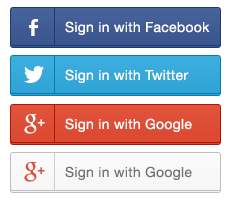Not want.
Need.
If a site has one of these…

… what is the least information they need from the user?
Seems to me that “social” login buttons like these are meant for the convenience of the user. But too often liberties are taken with them.
For example, here is what one company says in its terms & conditions:
Certain functionality may enable you to log-in using Facebook Connect, a Facebook, Inc. application, which is intended to provide interconnectivity between the Services and your Facebook.com profile. By using the Connect feature, you permit us to access your facebook.com profile, including without limitation, information about you, your friends and privacy settings. When you use the Connect feature, you also agree to allow Facebook, Inc. to use information about your activities on our site and to access your facebook.com cookies.
This is an otherwise respectful (and respectable) company, which is why I’m not naming them here. They are also a retailer, and not supported by advertising. Nor is their offering “social” in the “social media” sense.
And, while the company might want Facebook profile stuff to better understand their customers, do they need it?
In answering the question, What do fully respectful sites need from social login?, it helps to ask another question: What does the individual need from that button, other than to log in with one click?
I’m asking these questions because this button here…

… needs definition of what respectful login is.
As I said in Time for Digital Emancipation, the definition (via the Respect Trust Framework) is that the user and the site respect each other’s boundaries. So we need to say what those boundaries are, or what they might be under different conditions. But a good place to start is by asking what the bare minimum needs of a site are.
So, what are they?
Leave a Reply